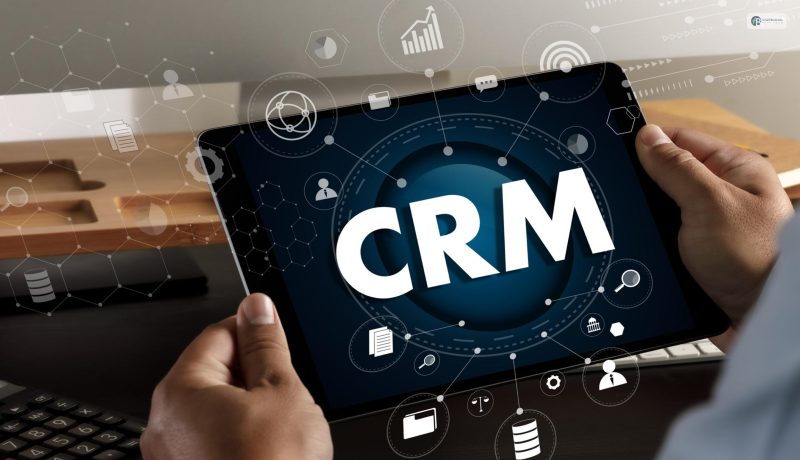Table Of Contents
- CRM Software for Small Business: A General Overview
- Essential Features of CRM Software
- 1. Better Organization of Data
- 2. Streamlined Sales Pipeline
- 3. Personalization of Customer Service
- 4. Data-Driven Marketing
- CRM Software for Small Business: A Selection Guide
- 1. Your Budget
- 2. Necessary Features
- 3. Research Various CRMs
- 4. Learn from Other Small Businesses
- 5. Check Out Free Trails and Demonstrations
- What Is the Cost of a CRM Software for Small Business?
- Wrapping Up
Choosing The Right CRM Software For Your Small Business: A Comprehensive Guide
To compete and stay relevant in the market, small businesses need tools to centralize data, make data-driven decisions, and ensure streamlined operations. Focusing on these needs and resolving them will pay off well for small businesses. Hence, the need for CRM software for small business operations increases in this regard.
By investing in a quality CRM, it will be easier to improve customer relationships, which can lead to business growth.
In this article, you will learn about how to choose the right CRM software for your small business. Furthermore, this article will explain the essential features of CRM software. Finally, you will also learn more about the cost you might have to incur while you invest in a CRM. Hence, to learn more, read on through to the end of the article.
CRM Software for Small Business: A General Overview

It is vital for a small business to manage relationships with customers. This is where the importance of a CRM software system comes to the fore. Basically, a CRM helps a business increase its sales and drive business growth. Apart from that, the role of CRM in sales management is significant.
According to the Forbes Advisor,
“CRM benefits include the ability to segment customers, personalize outreach, centralize and organize lead, customer and partner data, forecast sales trends, scale internal and external communication, automate tasks and data entry and discover actionable trends in customer data.”
However, the CRM that a business might need depends a lot on its operational needs and the types of customers it deals with. Generally, sales teams traditionally use CRM software systems. Apart from that, CRM software systems are also helpful for other needs and demands of the business. Hence, depending on the various needs of small businesses, CRM software developers include their systems with a variety of features.
Therefore, CRM software systems have significantly evolved over time. Now, it is not a simple customer management software anymore. It has become a robust tool that makes it easier for users to manage a variety of aspects. These include sales operations, PoS transactions, accounting, marketing, and also dealing with other types of data.
Essential Features of CRM Software

The importance of investing in CRM software lies solely in the number of features it offers, which benefits a business in its growth. However, it also depends a lot on how a business makes use of those features to its advantage.
The following are some of the major features of CRM software systems that you need to learn:
1. Better Organization of Data
Depending a lot on spreadsheets or notes can create data silos, especially if there are a lot of data. Here, a CRM helps by providing a central hub where all the information on sales, marketing, customers, and email are available. As a result, there is almost no loss of data, and the information access system works in tandem with the organization.
2. Streamlined Sales Pipeline
It is difficult for small businesses to effectively track leads and sales opportunities. Here, a CRM can help you by giving a better visual of your sales pipeline and better insights into data. As a result, there is better resource allocation and usage. Furthermore, automation also helps in saving a lot of time.
3. Personalization of Customer Service
As you will have better access to customer data, it will be easier to personalize your products and services to meet the needs and demands of your customers. Apart from that, with the introduction of AI in CRM software systems, you can work towards hyper-personalization.
4. Data-Driven Marketing
A small business means that you have a budget scarcity. Hence, you need to focus on targeted marketing campaigns. Furthermore, you can track customer interactions on various channels and learn from the data. This will also help you to make use of this data to segment your audience better. Hence, you can better curate your marketing campaigns.
CRM Software for Small Business: A Selection Guide

HubSpot.com states –
“There are all kinds of CRM software on the market, and sifting through them can be overwhelming. As a small company, it’s important not to get distracted by the bells and whistles that come with many enterprise-level software packages. You need a system that integrates marketing, sales, and service seamlessly.”
To choose the right CRM software for your business, you will first need to assess your business requirements. This will enable you to get a better idea of what you need that you do not currently have. Also, you can evaluate the areas where you need improvements in your sales and marketing operations.
The following are some of the major aspects that you need to consider while choosing the right CRM software for your business:
1. Your Budget
There are a variety of CRM software systems available. All these have different types and number of features. This factor determines the cost of each CRM. Hence, it is also necessary for you to determine your budget beforehand. As a result, on the basis of your budget, you will also need to narrow down your needs.
2. Necessary Features

There is no point in spending on features that you do not need for your small business. Hence, you need to choose the CRM software that closely resembles the features that you need. Furthermore, check different versions of the same CRM software to get a better idea of what works best for you.
3. Research Various CRMs
With changing times and technological developments, CRM software systems are constantly developing. Furthermore, with the introduction of AI, CRM systems are facing incredible developments. Hence, while choosing your CRM, you must make sure that the CRM uses recent technology and has strong integration capabilities.
4. Learn from Other Small Businesses

Get feedback from other businesses about a CRM software system that you like. This will give you a better idea of how it might work for you in the long run. Furthermore, you can also see other businesses using the CRM software they work with. Hence, this will help you shortlist your CRM application choices.
5. Check Out Free Trails and Demonstrations
Business News Daily recommends –
“Reach out to the companies you’re still considering to set up demo sessions to see the software in action and ask representatives any questions you might have. Many will offer free trials as well, so you can take the software for a test spin. Invite any members of your team who might be interested to participate so they can get a sense of the tools too and offer their feedback.”
Hence, after you complete the process, you will understand which CRM software you need for your business. Also, you will be able to narrow down your requirements and choose the options that suit your business the best.
What Is the Cost of a CRM Software for Small Business?

The costs of CRM software vary depending on the feature clusters that you need for your business. On the basis of the features that you need, you must choose the right subscription-based pricing model.
While some companies charge yearly, there are some that offer you the option to pay monthly. Hence, when choosing a CRM software system for your business, make sure you are aware of the features that you need.
Wrapping Up
Hence, you can see that one cannot understate the importance of CRM software for small business operations. It will not only improve your ability to generate and nurture leads, but it also help you in finding new customers. However, before you choose such software, you will need to consider the needs of your business.
How do you plan to utilize CRM for your small business? Consider sharing your ideas and opinions in the comments section below.
Continue Reading:














